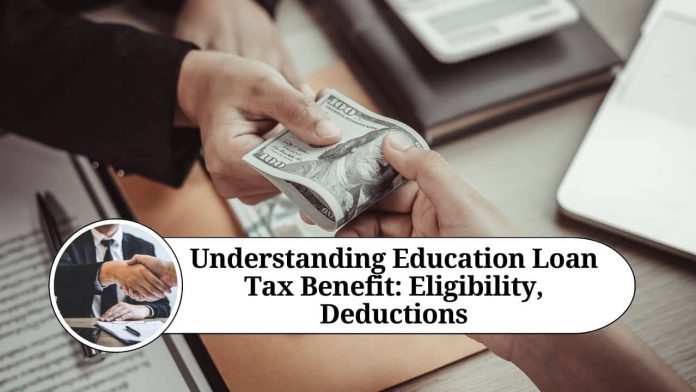Education Loan Tax Benefit: Everything You Need to Know
As the cost of higher education continues to rise, more and more students and their families are turning to education loans to help finance their education. Fortunately, the government provides tax benefits to students and their families who have taken out education loans. In this blog, we’ll go over everything you need to know about education loan tax benefits, including what they are, who is eligible, and how to claim them.
What is an Education Loan Tax Benefit?
An education loan tax benefit is a tax deduction that you can claim on the interest paid on your education loan. This tax benefit is designed to make higher education more affordable and accessible to everyone. Under section 80E of the Income Tax Act, 1961, the interest paid on an education loan is deductible from your total taxable income.
Who is Eligible for Education Loan Tax Benefits?
To be eligible for education loan tax benefits, you must have taken out an education loan to finance your own higher education or that of your spouse, children, or legal dependents. The loan must have been taken out from a bank or a financial institution and must have been used for paying the tuition fees, hostel fees, or any other expenses related to your education.
How to Claim Education Loan Tax Benefits?
To claim education loan tax benefits, you need to follow these steps:
Step 1: Obtain the Interest Certificate from the Bank or Financial Institution
The first step is to obtain the interest certificate from the bank or financial institution from which you took out the education loan. The interest certificate should have the details of the interest paid on the loan during the financial year.
Step 2: Calculate the Amount of Tax Deduction
Once you have the interest certificate, you need to calculate the amount of tax deduction that you are eligible for. You can deduct the entire amount of interest paid on the education loan from your taxable income.
Step 3: File Your Income Tax Return
After calculating the amount of tax deduction, you can file your income tax return. In the income tax return form, you need to enter the amount of interest paid on the education loan under section 80E. This will reduce your taxable income, and you will be able to save on taxes.
Other Related Blogs:
Other important things to note about education loan tax benefits include:
- No Cap on Deduction Amount
Unlike other tax deductions, there is no cap on the amount of interest that can be claimed as a deduction on an education loan. As long as you have taken out an eligible loan and have paid interest on it, you can claim the entire amount of interest paid as a deduction.
- The Deduction is Only for Interest Paid
It’s important to note that the education loan tax benefit is only applicable to the interest paid on the loan and not the principal amount. This means that you can only claim the interest component of your education loan repayment as a deduction and not the entire amount.
- The Deduction is Only for a Limited Period
The education loan tax benefit is only available for a limited period of time. It can only be claimed for the interest paid during the financial year in which the loan was taken and for up to 8 years thereafter. This means that you can only claim the tax benefit for a maximum of 8 years from the time you start repaying the loan.
- You Can Claim the Deduction
Even if You’re Not Earning One of the best things about the education loan tax benefit is that you can claim it even if you’re not earning any income. This means that even if you are a student who has taken out an education loan, you can still claim the tax benefit on the interest paid.
- The Loan Must be for a Recognized Course
In order to be eligible for education loan tax benefits, the loan must have been taken for pursuing a recognized course of study. This includes courses pursued after passing the Senior Secondary Examination or its equivalent from a recognized board, as well as vocational courses and courses pursued outside India.
- The Loan Must be Paid Back on Time
It’s important to note that you can only claim the tax benefit on the interest paid if you have made timely repayments on your education loan. If you have defaulted on the loan repayment, the tax benefit will not be applicable.
- The Loan Must be from a Recognized Bank or Financial Institution
To be eligible for the education loan tax benefit, the loan must have been taken from a recognized bank or financial institution. This includes banks, scheduled banks, and financial institutions that are approved by the government.
- The Tax Benefit is Available Only to the Person Who is Liable to Repay the Loan
It’s important to note that the education loan tax benefit is available only to the person who is liable to repay the loan. If you have taken out an education loan for your child or spouse, you can only claim the tax benefit if you are the one who is liable to repay the loan.
Conclusion
An education loan tax benefit can go a long way in making higher education more affordable and accessible. If you have taken out an education loan, make sure to claim this tax benefit to save on taxes. As always, it’s best to consult with a tax professional or financial advisor to make sure you’re taking full advantage of all the tax benefits available to you.
Frequently Asked Questions (FAQ’s)
Q1.) Who is eligible for the education loan tax benefit?
Anyone who has taken out an education loan for pursuing a recognized course of study is eligible for the tax benefit.
Q2.) How much tax benefit can I claim for education loan interest?
You can claim the entire amount of interest paid as a deduction with no cap on the amount.
Q3.) Is the education loan tax benefit applicable to the principal amount?
No, the tax benefit is only applicable to the interest paid on the education loan.
Q4.) Can I claim the education loan tax benefit even if I am not earning?
Yes, even students who have taken out an education loan can claim the tax benefit on the interest paid.
Q5.) Can I claim the education loan tax benefit for a loan taken from any bank or financial institution?
No, the loan must be taken from a recognized bank or financial institution approved by the government.
Q6.) What is the maximum duration for which the education loan tax benefit can be claimed?
The tax benefit can be claimed for the interest paid during the financial year in which the loan was taken and for up to 8 years thereafter.
Q7.) Is there a limit on the number of education loans for which I can claim tax benefits?
No, there is no limit on the number of education loans for which you can claim the tax benefit, as long as they are taken for a recognized course of study.
Q8.) What documents do I need to claim the education loan tax benefit?
You will need to submit the loan certificate, interest certificate, and a statement showing the amount of interest paid.
Q9.) Can I claim the education loan tax benefit if I have defaulted on the loan repayment?
No, the tax benefit is only available if you have made timely repayments on your education loan.
Q10.) Can I claim the education loan tax benefit for a loan taken for a course pursued outside India?
Yes, education loans taken for courses pursued outside India are also eligible for the tax benefit, as long as they are for a recognized course of study.





















Great post. I think you should write more and more. I really like when you`re writing. This is so good
Were required to give you that very little remark only to thanks again because of these spectacular techniques you have provided in this posting. It’s so particularly generous with folks like you to provide unreservedly what many people could have marketed as a possible e-book to earn some dough in their own business, primarily given that you could have used it if you ever wanted. The tactics also acted to get good way to know that most of us have similar desire as my very own to grasp very much more about it condition. I’m sure there are countless nicer opportunities at the start for individuals who read through your blog site post.
You’d superb suggestions there. I did a research about the issue and identified that likely almost anyone will agree with your web page.
You really should take part in a contest for starters of the finest blogs over the internet.